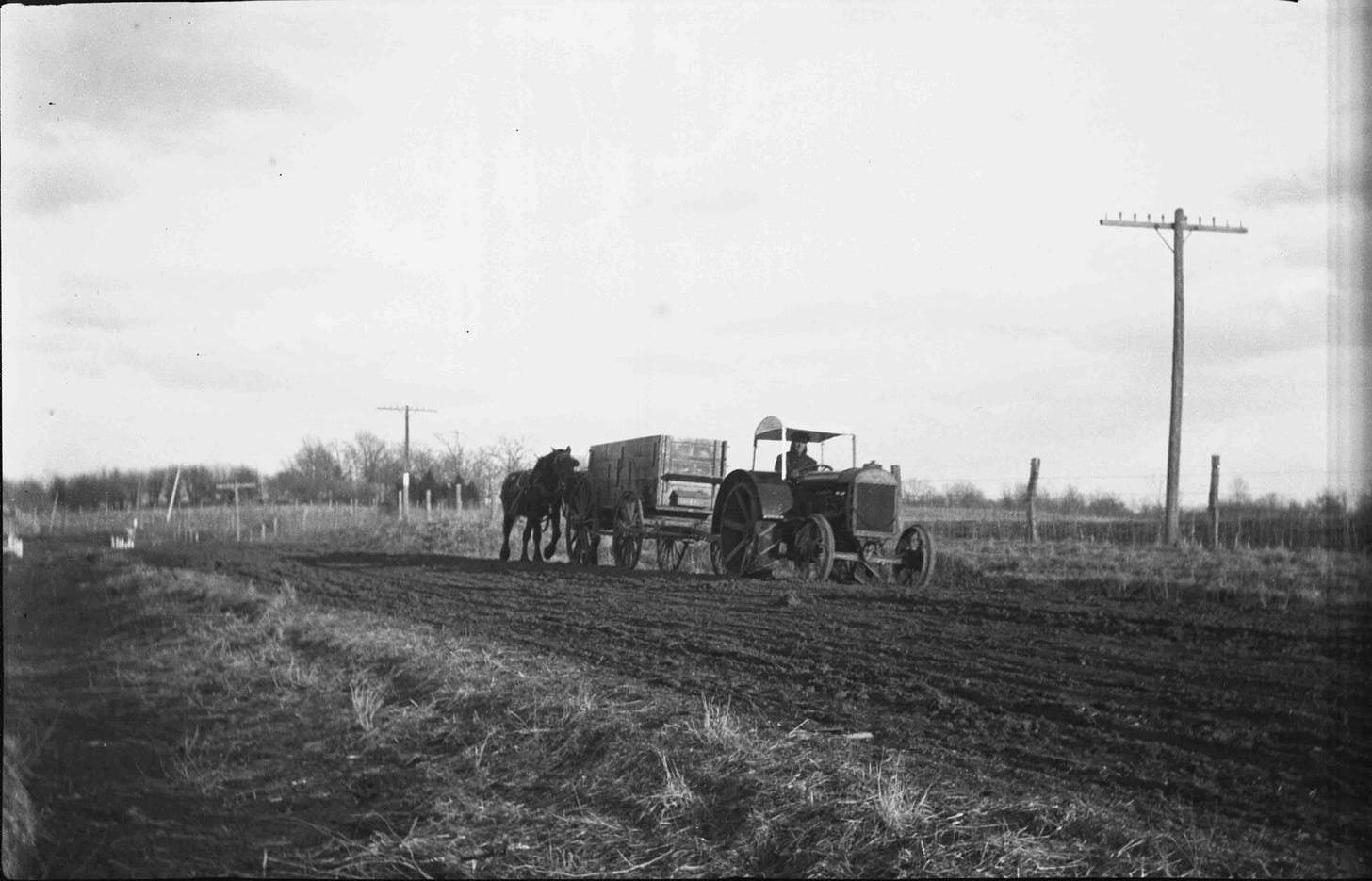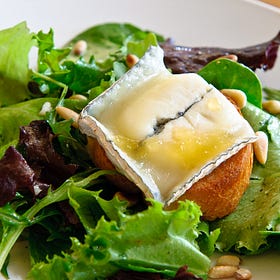Disrupted. Or, My Tractor Story
I once had a jam-packed career writing food and wine articles, newspaper restaurant reviews, cookbook feature copy, and more. Then, everything changed. And here's why that's OK.
Not too long ago, I began to feel like the horses in this photo.

Taken by my grandmother, this photo shows the day that the first tractor arrived at my grandparent’s farm in Greene County, Iowa. That morning, my grandfather rode his wagon into town, driven by his workhorses. This picture is of him, coming home, the horses trailing behind the wagon. From this day on, tractors, not horses, would power his work in the fields.
I have seen this old photo many times over the years, and each time I see it, something new reveals itself. I’ve thought in the past of how the dirt road in front of the farmstead is the old Lincoln Highway, before it was paved. I’ve felt longing for those farm fields, which decades later would give me such a sense of place in my youth. I’ve marveled at the beat old wagon, which looks like something straight from the Wild West.
One day recently, I looked closer and wondered: Do I see a prideful smile on my young grandfather’s face as he catches sight of his young wife steadying her camera to take the photo?
A couple years ago, I came upon this photo once again, and the word, “disrupted” came to mind.
*****
Once upon a time, I had an incredibly busy and surprisingly lucrative career writing food and wine articles, restaurant reviews, cookbook feature copy, and more. I never lacked for great assignments; after meeting with one editor at the lifestyle publishing company where I picked up most of my freelance work, I could rarely get out of the building without hearing someone call my name as I walked past the cubicles and offices. “There you are! Can you take on another assignment? I need you to write … ”
It was a great run.
And then one day, a tractor rolled into town and the horses became obsolete. Or something like that.
Little by little, most of the editors I’d been working with for almost two decades got laid off (though some were lucky enough to retire). Each time they packed up their belongings from their cubicles and walked out the door, a piece of me went with them.
The print media I loved was like my grandfather’s horses in that photo. The digital media became the shiny new tractor.
While I managed to get some steady work in big-digital publishing, I have to admit that my heart was never that into it. I do not cherish the shallow clickbait style of writing that I was often offered. Trying to cajole search-engine optimization terms into stories was not the way I wanted to spend my days. Plus, I missed the meaningful bonds I had developed with my editors. The new SEO/clickbait work was often assigned via content platforms by people I never talked to, let alone met in person. It felt wrong to approach something as deeply rooted in connection as food with such cold, impersonal systems.
Clearly, I had been disrupted, not unlike the horses that were likely sold off soon. God knows what happened to them.
*****
But these days, I take great inspiration from the photo, because I no longer look at the horses or the tractor. What inspires me most about the photo is what remains unseen: the photographer, my grandmother, Anna Cox Monthei.
Long after she died, I marveled that she had had the vision to know what a weighty moment this was. I imagine her dropping everything that a 1919 Iowa farm wife had to do that morning, then running outside with her camera and shooting this picture of her husband, Albert, his tractor, wagon, and horses. And this is only one of some 1,600 resonant photos she took of farm life in the day.
Farmwife. Legendary cook. Photo-historian. Artist. This is how I think of her.
So, I quit thinking about the horses, and thought about Anna, who, through her photography, told the stories of a time and place that only she could tell, in a way only she could tell them.
As I navigate the shifts in my own life, I find myself guided by her example. I no longer write what I’m assigned to write. I write what only I can write; I write the stories I truly want to tell.
I recently did just that with my memoir, “Love Is My Favorite Flavor: A Midwestern Dining Critic Tells All.” And I continue to do that with my work here.
Perhaps there’s a takeaway for you here as well. Whatever it is you’re doing, you may well get disrupted somewhere along the way, if you haven’t already. When that happens, think of Anna.
Seek to do the work that only you can do, and do it in a way that only you can do it.
P.S.: What’s This Got to Do with France?
While most of my stories in this newsletter center on my extensive experiences in France, occasionally I offer a story of food from elsewhere (that’s why this newsletter is called, “On Food & France”). And any time one of my stories focuses on our family’s ancestral farm in Iowa, it’s about food. The farm is at its essence, about food.
If you like my narratives, please consider becoming a subscriber to this newsletter. Prefer recipes? I’m also building my section of 25 Essential French Recipes—recipes I personally make again and again to bring a taste of La Belle France to my table when I’m not overseas. Check out my most recent addition:
Warm Goat Cheese Salad the Way It Should Be
Have you ever tried a salade au chèvre chaud—warm goat cheese salad—in the U.S. and wondered why it wasn’t as great as you’d expect from a French classic? The trick is simply this: You have to use the right cheese. Read on!






I'm just so grateful our paths finally crossed and I'm gonna start taking mo' time to enjoy the stories you have to share 🍒❤️
I love the family photos, along with how they relate to your life today. A lovely (and inspiring) post, Wini. Thanks for sharing.